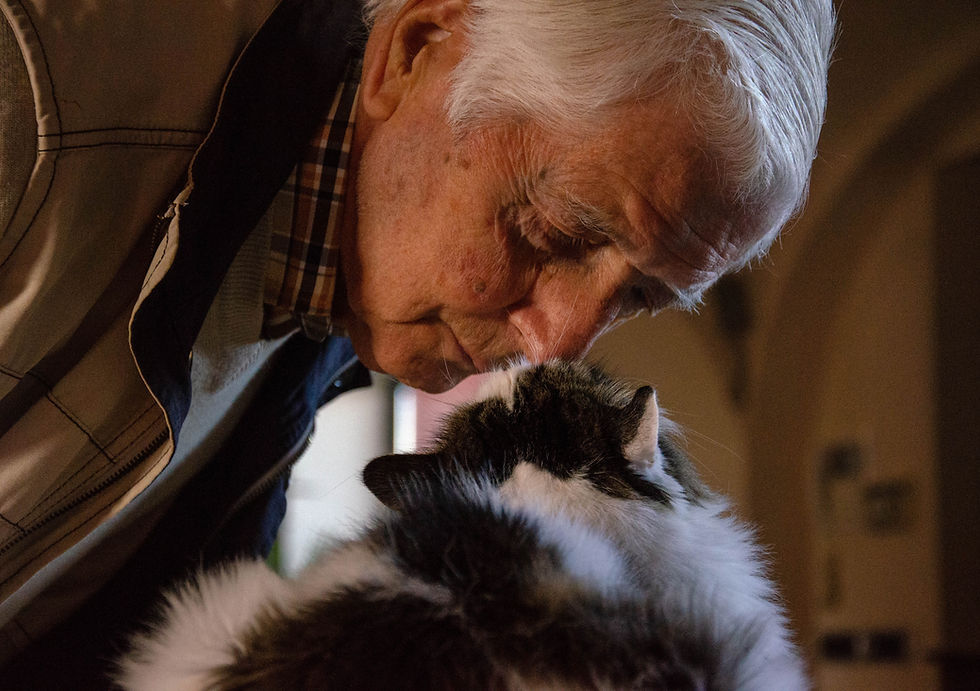Winter Wellness: Recognising and Preventing Arthritis in Aging Cats
- Eleanor Flynn
- Dec 8, 2023
- 3 min read
In winter it is essential to pay extra attention to our senior feline companions. Aging cats, like humans, may experience increased discomfort in their joints during colder weather, particularly if they suffer from arthritis. In this blog post, I will explore the effects of cold weather on aging cat joints and provide proactive measures to recognize, manage, and prevent arthritis discomfort in our beloved senior cats.

Understanding Arthritis in Cats: Arthritis is a common condition in aging cats, characterised by inflammation in the joints. Cold weather can exacerbate arthritis symptoms, leading to stiffness, decreased mobility, and increased discomfort for senior feline friends.
The Impact of Cold Weather: Cold temperatures can affect arthritis-afflicted joints by causing them to be stiffer and more painful, making movement more challenging. Cats with arthritis may exhibit reluctance to move, reluctance to jump, or changes in grooming habits as colder weather sets in. Over half of cats older than 9 years of age and an astounding 90% of cats over the age of 12 will have some degree of arthritis, so even though you may not see obvious signs of arthritis in your cat, it is highly likely that they are hiding it from you if they are older than 12.

Recognising Arthritis Symptoms:
Reduced Activity: Arthritic cats may become less active, especially during colder weather. Often, this is the only sign of arthritis that a cat will display. It can be easy to put this sign down to "aging" and ignore it without getting your cat any help, but there are many good treatments for arthritis, so this sign should not be ignored.
Changes in Behavior: Increased irritability or changes in behavior, such as becoming more aggressive or "grumpy", can be indicators of joint pain.
Limping or Favoring Limbs: This is a relatively uncommon sight of arthritis in cats, but you can watch for changes in your cat's gait, favoring one limb or showing signs of lameness.
Proactive Measures for Arthritis Management: Warm and Cozy Spaces: Provide comfortable and warm sleeping areas for your cat, ensuring they have cozy spots away from drafts.
Gentle Exercise: Encourage low-impact exercises like gentle play and controlled movements to maintain joint flexibility.
Nutritional Support: Consult with your veterinarian about joint supplements or specialized diets that may support joint health.
Medication: There are several medications on the market for arthritis - these range from tablets to liquids to injections - surely something to help every cat! You can find more information about the medications for arthritis here.

Preventing Arthritis Discomfort:
Regular Vet Checkups: Schedule regular checkups to monitor your senior cat's joint health and catch arthritis early.
Weight Management: Maintain a healthy weight for your cat to reduce stress on their joints.
Warmth and Comfort: Winterizing Your Senior Cat's Environment: Heated Beds: Consider providing heated beds to keep your senior cat warm during colder nights.
Indoor Comfort: Ensure your cat has a cozy, indoor retreat away from cold drafts.
Consulting Your Veterinarian: If you suspect your cat is experiencing arthritis discomfort, consult with your veterinarian. They can provide a tailored management plan, including pain relief options and lifestyle adjustments.





Comments